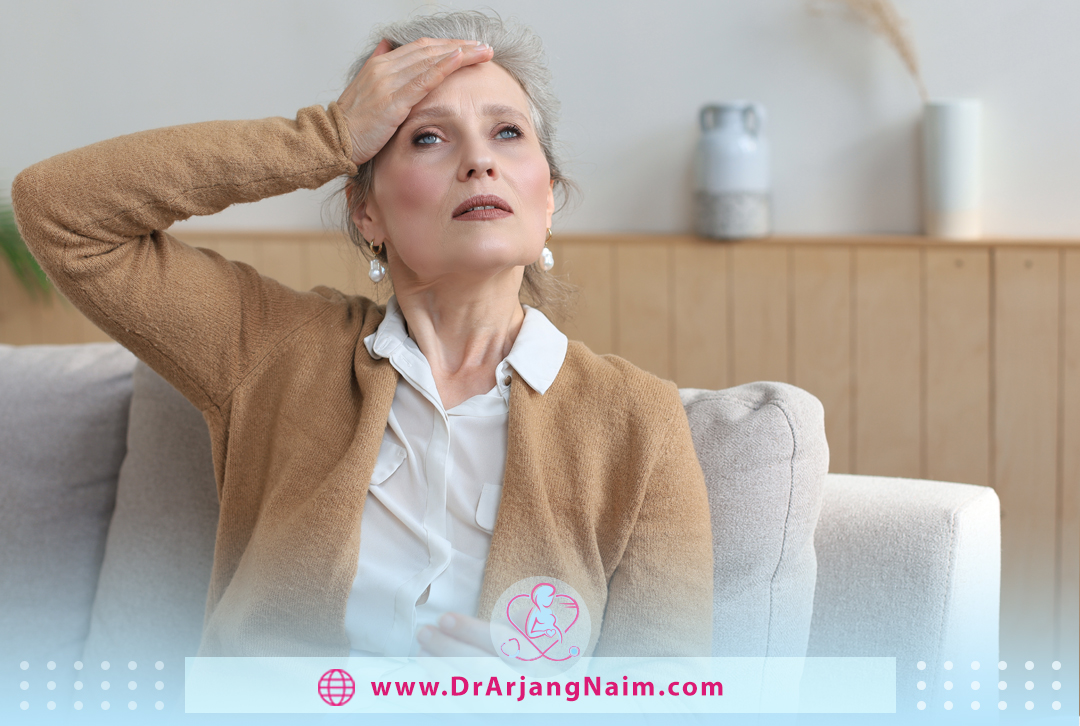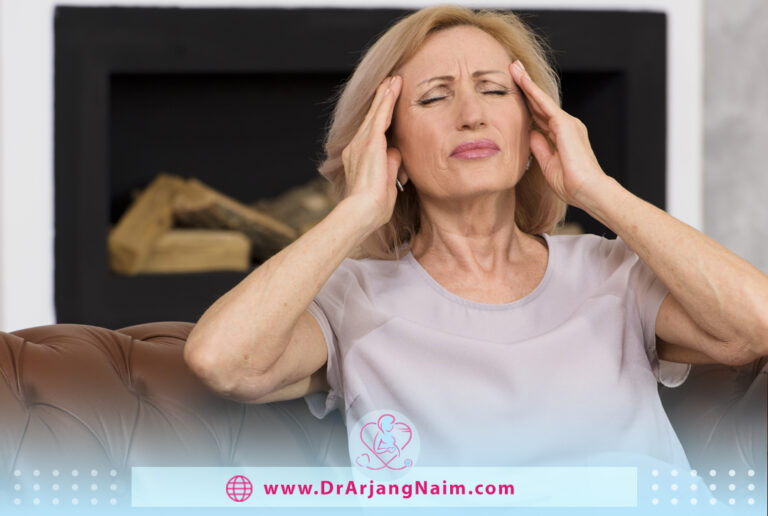Some cancer treatments can cause early or temporary menopause or side effects similar to menopausal symptoms. Menopause is a natural biological process that marks the end of a woman’s reproductive years. It typically occurs between 45 and 55, with the average age around 51. Menopause is characterized by a decline in the production of reproductive hormones, particularly estrogen, and progesterone, which leads to the cessation of menstruation and various physical and emotional changes.
Conversely, cancer treatment refers to the medical interventions used to treat various forms of cancer, including surgery, chemotherapy, radiation therapy, targeted therapy, immunotherapy, and hormone therapy. Cancer treatments are aimed at destroying or inhibiting the growth of cancer cells.
There can be an overlap between menopausal symptoms and cancer treatment effects, especially when certain cancer treatments disrupt hormone production or function. Some cancer treatments, such as hormone therapy, can induce menopausal-like symptoms or exacerbate existing menopausal symptoms.
What is the menopause?
Menopause is a natural biological process that marks the end of a woman’s reproductive years. It is a normal and inevitable stage in a woman’s life cycle. Menopause is defined as the point in time when a woman has not had a menstrual period for 12 consecutive months. It is usually diagnosed retrospectively after a year has passed without menstruation.
During menopause, a woman’s ovaries gradually produce fewer reproductive hormones, particularly estrogen and progesterone. This hormonal shift leads to the cessation of ovulation (release of eggs) and the eventual end of menstruation. Menopause typically occurs between 45 and 55, with the average age around 51. The transition into menopause involves several stages:
- Perimenopause
- Menopause
- Postmenopause
It’s important to note that menopause is a unique experience for each woman. Some women may transition through this phase with relatively mild symptoms, while others may experience more pronounced physical and emotional changes.

Symptoms of menopause
Changes in hormone levels can cause symptoms, including:
- Hot flushes and sweats
- Vaginal dryness
- Loss of interest in sex
- Difficulty sleeping
- Weight gain
- Mood swings
- Loss of confidence
- Poor concentration
- Dry skin
- Aches and pains
- Needing to pass urine (pee) more often
Most women have some of these symptoms. Symptoms can vary from mild to severe. Some women, they remain for several years. If menopause happens suddenly because of cancer treatments, symptoms sometimes get worse.

What cancer treatments can cause menopause?
Treatment-induced menopause can occur with various cancer treatment options, including:
- Chemotherapy
- Radiotherapy
- Surgical removal of the ovaries
- Hormone Therapy
Chemotherapy is considered the most common cause of premature menopause. Some drugs used in chemotherapy treatment cause damage to the ovaries, which in turn leads to menopause.
When the ovaries are damaged, the production of female hormones, such as estrogen, is greatly reduced. This is what causes menopause, fertility, and other reproductive issues. Without hormones like estrogen to regulate a woman’s menstrual cycle, her body will eventually stop releasing eggs from her ovaries, and her menstrual cycle will stop.
Premature menopause can last for the duration of the patient’s treatment and the rest of her life, and unfortunately, it is difficult to predict how long the experience will last. It can be hard for women to hear that there are no answers to when their fertility might prove itself, but this is the reality of treatment, which women should consider and be prepared for.
Several factors can play a role in the possibility of women’s menstrual cycle returning, such as the age before starting the treatment and what drugs are used in that treatment.
Management of menopause caused by cancer treatment
Managing menopausal symptoms that arise from cancer treatment, such as chemotherapy, radiation therapy, or hormone therapy, requires a comprehensive and individualized approach. The goal is to alleviate discomfort and improve the patient’s quality of life during this challenging time. Here are some strategies for managing cancer treatment-induced menopause.
Consult your healthcare team
Communicating openly with your oncologist and other healthcare providers about the symptoms you’re experiencing is crucial. They can help determine the underlying cause of the symptoms and develop a personalized management plan.

Hormone replacement therapy (HRT)
In some cases, hormone replacement therapy may be recommended to alleviate severe menopausal symptoms. Estrogen therapy alone or with progesterone can help relieve hot flashes, night sweats, and vaginal dryness. However, the decision to use HRT should be carefully considered, as it may not be suitable for everyone and could have implications for certain types of cancer. Your healthcare provider will weigh the potential benefits against the risks based on your circumstances.
Lifestyle modifications
Adopting a healthy lifestyle can significantly improve menopausal symptoms. This includes maintaining a balanced diet rich in fruits, vegetables, and whole grains, engaging in regular physical activity, managing stress through relaxation techniques or mindfulness, and getting adequate sleep.
Cooling strategies
To manage hot flashes, keep your environment cool and use lightweight, breathable clothing. You can also use fans, cold beverages, and cool compresses to help reduce body temperature.
Vaginal health
For vaginal dryness and discomfort, consider using water-based lubricants or vaginal moisturizers. Your healthcare provider may also recommend topical estrogen therapy if it’s safe for your situation.
Bone health
Estrogen plays a role in maintaining bone density, and its decline during menopause can increase the risk of osteoporosis. Your healthcare provider may recommend calcium and vitamin D supplements, weight-bearing exercise, and bone density testing.
Emotional support
Dealing with cancer treatment and menopause simultaneously can be emotionally challenging. Seek support from friends, family, support groups, or mental health professionals to help manage anxiety, mood swings, and other emotional changes.
Maintain regular check-ups
Continue to schedule regular follow-up appointments with your healthcare team to monitor your overall health, discuss treatment effects, and adjust your management plan as needed.
Alternative therapies
Some individuals find relief from menopausal symptoms through alternative therapies such as acupuncture, yoga, meditation, and herbal supplements. However, discussing these options with your healthcare provider before trying them is important.
Remember that every individual’s experience with cancer treatment-induced menopause is unique, and there is no one-size-fits-all approach. Your healthcare team will work with you to tailor a management plan considering your cancer diagnosis, treatment, and overall health status. Open communication and collaboration with your healthcare providers are key to finding effective strategies for managing menopausal symptoms during cancer treatment.
Long-term health problems that can arise from your menopause
Menopause is a natural biological process that marks the end of a woman’s reproductive years. While it is a normal transition, it can be associated with various changes in the body that may have long-term health implications. It’s important to note that not all women will experience these issues, and individual experiences can vary widely.

Osteoporosis
The decline in estrogen levels during menopause can decrease bone density, increasing the risk of osteoporosis. This condition weakens bones and makes them more susceptible to fractures. Maintaining bone health is important, such as consuming a calcium-rich diet, engaging in weight-bearing exercises, and discussing bone density testing and appropriate interventions with your healthcare provider.
Cardiovascular health
Estrogen plays a protective role in heart health by promoting healthy blood vessel function. After menopause, the risk of heart disease may increase. Adopting heart-healthy lifestyle habits, such as maintaining a balanced diet, engaging in regular physical activity, managing blood pressure and cholesterol levels, and avoiding smoking, is important.
Weight gain
Many women notice changes in body composition and metabolism during and after menopause, which can contribute to weight gain. Hormonal changes, decreased muscle mass, and lifestyle factors can all play a role. Regular exercise and a balanced diet can help manage weight and support overall health.
Vaginal health
Vaginal dryness and thinning of vaginal tissues can occur after menopause due to decreased estrogen levels. This can lead to discomfort during sexual activity and an increased risk of vaginal infections. Using water-based lubricants or vaginal moisturizers and discussing topical estrogen therapy with your healthcare provider can help maintain vaginal health.
Urinary health
The decline in estrogen can also impact the health of the urinary tract, potentially leading to issues such as urinary incontinence and urinary tract infections. Kegel exercises to strengthen pelvic floor muscles, stay hydrated, and discuss treatment options with your healthcare provider can help manage these concerns.
Mood changes and mental health
Some women may experience mood changes, including an increased risk of depression and anxiety, during and after menopause. Hormonal fluctuations and other factors can contribute to these changes. Seeking emotional support, practicing stress-reduction techniques, and discussing potential treatments with a mental health professional can be beneficial.
Cognitive function
Some research suggests hormonal changes during menopause may affect cognitive function, including memory and concentration. While these changes are generally subtle, staying mentally active, engaging in brain-stimulating activities, and maintaining a healthy lifestyle can support cognitive health.
Metabolic changes
Hormonal changes can impact metabolism, potentially affecting insulin sensitivity and increasing the risk of type 2 diabetes. Monitoring blood sugar levels, maintaining a healthy weight, and following a balanced diet can help manage metabolic health.
It’s important to approach menopause with a proactive and holistic mindset. Regular check-ups with healthcare providers, adopting a healthy lifestyle, and discussing any concerns or symptoms you may be experiencing can contribute to long-term well-being during and after the menopausal transition. Each woman’s experience is unique, so working closely with healthcare professionals to tailor a plan to your needs is essential.
The bottom line
Menopausal symptoms can be influenced by cancer treatment and may have long-term health implications. A personalized approach that considers both menopause and cancer treatment effects, along with guidance from healthcare professionals, is essential to effectively manage symptoms and ensure overall well-being.
Dr. Arjang Naim is the best, most well-known OB-GYN treating patients in Los Angeles, California, and the surrounding communities; he can help patients to reduce the symptoms of menopause and perform hormone therapy if needed.
Additional questions
- Can menopausal symptoms impact the effectiveness of cancer treatment?
Menopausal symptoms themselves generally do not impact the effectiveness of cancer treatment. However, managing these symptoms can improve the quality of life during and after treatment.
Remember, every individual’s experience with menopausal symptoms during cancer treatment is unique. Working closely with your healthcare team to develop a personalized plan that addresses your specific needs and concerns is important.
- Is there a timeline for when menopausal symptoms caused by cancer treatment might improve?
The duration and severity of menopausal symptoms vary. Some symptoms may improve shortly after treatment, while others might persist. It’s best to consult with your healthcare team for personalized guidance.
- Can exercise and a healthy diet alleviate menopausal symptoms for cancer survivors?
Yes, regular exercise and a balanced diet can help manage menopausal symptoms and improve overall well-being for cancer survivors.
- What is surgical removal of the ovary?
Ovarian removal is called oophorectomy. If only one ovary is removed, it is called a unilateral oophorectomy. If both are removed, it is called a bilateral oophorectomy.
- Can you have chemotherapy if you have osteoporosis?
Cancer treatments such as chemotherapy or hormone therapy can also cause osteoporosis. If you already have osteoporosis, some cancer treatments can make it worse. If you have symptoms of osteoporosis or are concerned about your bone health during cancer, talk to your healthcare team.
References
https://www.themenopausecharity.org/2021/10/21/menopause-and-cancer/
https://www.compassoncology.com/cancer-survivorship/side-effects/early-menopause




